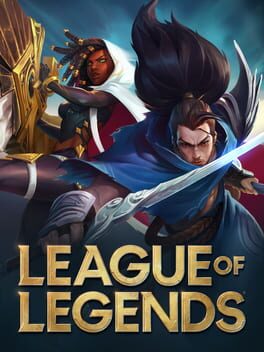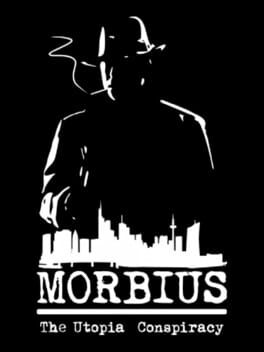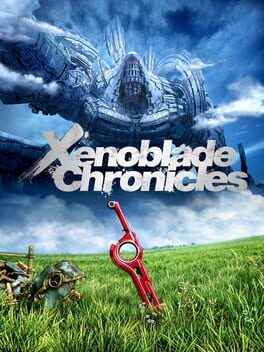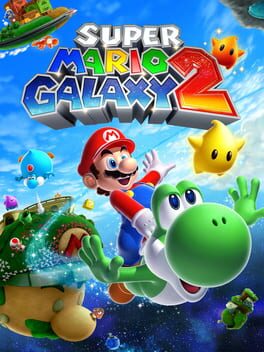GamerDan6
329 reviews liked by GamerDan6
League of Legends
2009
Undertale
2015
Undertale
2015
League of Legends
2009
Persona 5 Royal
2019
Cheggers' Party Quiz
2007
God of War
2018
Yakuza 0
2015
YOU DON'T GET TO THE TOP BY CRYING
The buildup I experienced going into Yakuza 0 was intense for a multitude of reasons. Not only did my decision to go in release order (LAD notwithstanding) lead to me going through several games before reaching this one, not only did I have to endure trials to play this on PC, which ultimately ended in failure, but because this was built up as the best game in the series and one of the best games ever made. While I don’t think it lives up to THAT high of a standard, it’s still a fantastic game with some of the highest highs the series has ever seen.
To start with the gameplay, it has a pretty interesting innovation with its combat. This game introduces the style system, where you can switch between three different fighting styles for each character, with a fourth one based on their original movesets being unlocked after the Real Estate and Cabaret side games. I really like this system, it adds a good amount of variety to combat while also being really, for lack of a better term, stylish. Also, the more the gap between Yakuza and Devil May Cry is bridged, the better.
I’ll briefly go over each of the main fighting styles, starting with Kiryu’s. Brawler style is cool as a sort of early version of Kiryu’s normal fighting style. I noticed quite a few parallels between it and the Legend style he unlocks later, but with Brawler being quite a bit more scrappy, which is fitting for Kiryu’s place in the story. Rush was my personal favorite to use, especially for 1 on 1 fights. I really like the mobility it offers, and the bobbing and weaving you can do with some moves and the guard almost made me feel like I was playing God Hand at times. I wasn’t a fan of Beast style at first, I didn’t see much utility in the guarding mechanic it had, but once I unlocked more abilities, including some attacks that come out of the guarding stance, I realized that Beast style is completely broken. It was an easy go-to for tearing apart crowds.
Moving onto Majima’s, I feel like Thug is a similar type of early adoption of Majima’s fighting style that Brawler was for Kiryu, though I think Thug’s focus on movement and evasion is a bit more interesting. It feels like a closer equivalent to Rush than Brawler at times. The Slugger style rivals Beast in how meathead-y it can be, even with just the bat by itself. I think it ties in with how Majima has a much emphasis on different weapons between the two. The last one I want to go over is Breaker, which is my favorite in terms of choreography. Incorporating breakdancing into combat is really cool to see, and this is one of my favorite examples of it in a game. Really like the freeze poses too, those are dope. Overall I’m a big fan of the style system, I’m excited to see how the system is expanded on in the Judgment games.
A really cool piece of how it incorporates its mechanics into the story is the role of money. The most brought up example is the progression system, but it’s a recurring thread through every facet of the game. Most of the key facets of the plot are about making money and buying properties, it forms a handful of the villains’ ideologies, and a good chunk of the substories focus on money. It’s really cool that the focus on money, as symbolism of Japan’s bubble economy at the time, has a really large presence.
But the most notable one is its skill trees, which has a lot going for it. I think its structure is the best middle ground the series has had between the freeform skill orb system in 4 and the more linear progression of the other games in the series. I still think 4 has my favorite leveling system for how much freedom you have with spending orbs, but I see a lot of value in the skill tree. Speaking of value, I do like the idea of making money the indicator of your progress. Like I said, money is a large aspect of 0’s story and time period, so tying that into your growth for both characters is really neat. I also like how this means progression isn’t just tied to combat or substories. You can get tons of money from selling items, gambling in the Fate Extra catfighting ring, or engaging in each of the characters’ main side stories. Going through them as you move forward makes the feeling of progression satisfying in a pretty unique way for the series.
So there's all sorts of systems that help you make money and support this system really well. However, there's one teensy-weensy but ever so crucial tiny, little detail. None of them matter. For the purposes of gaining money, every single one of these methods is completely irrelevant. And that's all because of one man. Or rather, because of four men…
I like Mr Shakedown in theory, having a superboss walk down the street with steep consequences for losing, while resulting in a massive payout if you beat him. They even have funny little stories as you fight them. In execution, his presence completely ruins the progression of the game. It doesn’t take long for the fights to become incredibly easy to exploit, completely eliminating the risk element of the risk-reward system and making for a painfully easy way to get billions of yen in no time flat. It makes it so that any money management from the side games is nonexistent, making the possibility of doing them all in one go rather than doing them over the course of the game much easier, and, more importantly, you can max out skill trees incredibly fast. I feel like the team was slightly aware of this, so they had to balance the skill tree around him by making sharp price hikes in abilities, especially for Kiryu. But then the result of that is feeling the need to grind out Mr Shakedown to get anywhere close to getting more skills. Being able to max yourself out this easily, alongside the side modes for each character (which are much easier to do all in one go than people would have you believe), leads to the bosses feeling like complete jokes until the very last chapter of the game. This is by far the most exploitable progression system in the series, to the point that it was incredibly hard to ignore. I feel like the game would be better off without that system in place.
But let’s put all of that aside because, as much as I really like it, the gameplay isn’t really the main appeal of the series, the story is. I was originally going to start this by hardening my stance on its role as a starting point, (To summarize, I think starting with the originals is the best way to go about it, but if you start with 0 or LAD like I did, I won’t hold it against you) but I think focusing on that will distract from how it being the 6th title impacted the way I perceive the story. I think the game’s structure is the best execution of having multiple protagonists that they’ve done in the series. Frequently switching back and forth between Kiryu and Majima does wonders for holding my interest in both of them, especially with the TV serial style they’re going for with this. Kiryu’s side of the story is pretty awesome. It’s interesting to see Kiryu in a state where he’s still learning and not anywhere close to the level of dominance that he has in the other titles. It’s cool seeing the way he’s influenced by the people closest to him, and those that challenge him throughout the game. However, I felt that Majima’s side was much stronger in this regard. It might be a stretch to say, but this almost feels more like Majima’s story than Kiryu’s at points. My main intrigue for this was due to seeing him before the events of this game in Yakuza 4, and I’m glad to see they really capitalized on that. Seeing Majima start to cut loose due to his personal stake in the events of the story is the coolest thing. All of Majima’s dialogue in the final chapter had me absolutely giddy.
The villain lineup was also pretty good, I’ll go through each of them briefly. Kuze is great, easily my favorite of the three lieutenants. I love how persistent he is, he’s like a rival character in an action game that’s constantly testing Kiryu. He also happens to have the best boss theme in the game, but that’s besides the point. Shibusawa is pretty neat too, though I feel like he could’ve had a closer dynamic with Kiryu before the very end, like what Kiryu had with Kuze. Kuze and Shibusawa sort of remind me of Saix and Xemnas from Kingdom Hearts II, where the latter has a more imposing role in the narrative, but the former feels more like the main antagonist through his relationship with the MC. The third lieutenant, Awano was a bit of a letdown tbh. His speech to Kiryu was fantastic, but it feels like they didn’t know what to do with him after that point and kind of forced him into a boss fight. The last one I want to mention, Sagawa, is my favorite villain of the entire game. In each scene he’s in, he exudes so much pressure from his calm expressions and the way he talks. Every exchange he has with Majima feels like he’s seeing right through him and has him completely under his thumb. It makes it all the more interesting to see the kind of impact he has on Majima as a character. And that’s the key part of Yakuza 0, we get to see how the people that Kiryu and Majima meet and the actions they take influence them, and form the way they understand the world and themselves. But as satisfying as their growth is, all of it has a tinge of sadness to it, with the knowledge of what’s to come.
I think the most important part of having the context of the whole series as I played, was the way it unmasked the tale’s true nature. All the way through to the credits, Yakuza 0 is a tragedy. When I saw those very scenes of their growth, like any scene with Kiryu and Nishikiyama, or the epilogues of both protags’ stories, I found myself constantly thinking of what they would become in the future, how their decisions to follow these paths would lead to them being thrown into a world that will tear them apart, one that they can’t escape from no matter how many times they pull through. The dark undercurrents of every event, no matter how lighthearted or exhilarating a moment could be, really stung in so many moments. Even if you played 0 first, I urge you to go through it one more time after 5 just to feel the impact of this.
But beyond all the great writing, fun combat or tragic undertones, this game reminded me of my deep love for a series that, relatively speaking, I’ve only recently been acquainted with. I know it sounds superficial, but all of the the small moments of noticing references to past games, like certain music tracks or appearances of characters, and recognizing how the people that Kiryu, Majima and the others met over the course of these twin journeys made them into the people that are so close to my heart, it all really got to me. No amount of critiques I have, even the most damning ones, are going to change that for me. This and Like A Dragon make me really excited for the future of the franchise, and all of the twists and turns that come with it. I’m really happy that I got a chance to go through this series. RGG studios, for whatever your future has in store, I’ll receive you, cause you always brighten my life.
The buildup I experienced going into Yakuza 0 was intense for a multitude of reasons. Not only did my decision to go in release order (LAD notwithstanding) lead to me going through several games before reaching this one, not only did I have to endure trials to play this on PC, which ultimately ended in failure, but because this was built up as the best game in the series and one of the best games ever made. While I don’t think it lives up to THAT high of a standard, it’s still a fantastic game with some of the highest highs the series has ever seen.
To start with the gameplay, it has a pretty interesting innovation with its combat. This game introduces the style system, where you can switch between three different fighting styles for each character, with a fourth one based on their original movesets being unlocked after the Real Estate and Cabaret side games. I really like this system, it adds a good amount of variety to combat while also being really, for lack of a better term, stylish. Also, the more the gap between Yakuza and Devil May Cry is bridged, the better.
I’ll briefly go over each of the main fighting styles, starting with Kiryu’s. Brawler style is cool as a sort of early version of Kiryu’s normal fighting style. I noticed quite a few parallels between it and the Legend style he unlocks later, but with Brawler being quite a bit more scrappy, which is fitting for Kiryu’s place in the story. Rush was my personal favorite to use, especially for 1 on 1 fights. I really like the mobility it offers, and the bobbing and weaving you can do with some moves and the guard almost made me feel like I was playing God Hand at times. I wasn’t a fan of Beast style at first, I didn’t see much utility in the guarding mechanic it had, but once I unlocked more abilities, including some attacks that come out of the guarding stance, I realized that Beast style is completely broken. It was an easy go-to for tearing apart crowds.
Moving onto Majima’s, I feel like Thug is a similar type of early adoption of Majima’s fighting style that Brawler was for Kiryu, though I think Thug’s focus on movement and evasion is a bit more interesting. It feels like a closer equivalent to Rush than Brawler at times. The Slugger style rivals Beast in how meathead-y it can be, even with just the bat by itself. I think it ties in with how Majima has a much emphasis on different weapons between the two. The last one I want to go over is Breaker, which is my favorite in terms of choreography. Incorporating breakdancing into combat is really cool to see, and this is one of my favorite examples of it in a game. Really like the freeze poses too, those are dope. Overall I’m a big fan of the style system, I’m excited to see how the system is expanded on in the Judgment games.
A really cool piece of how it incorporates its mechanics into the story is the role of money. The most brought up example is the progression system, but it’s a recurring thread through every facet of the game. Most of the key facets of the plot are about making money and buying properties, it forms a handful of the villains’ ideologies, and a good chunk of the substories focus on money. It’s really cool that the focus on money, as symbolism of Japan’s bubble economy at the time, has a really large presence.
But the most notable one is its skill trees, which has a lot going for it. I think its structure is the best middle ground the series has had between the freeform skill orb system in 4 and the more linear progression of the other games in the series. I still think 4 has my favorite leveling system for how much freedom you have with spending orbs, but I see a lot of value in the skill tree. Speaking of value, I do like the idea of making money the indicator of your progress. Like I said, money is a large aspect of 0’s story and time period, so tying that into your growth for both characters is really neat. I also like how this means progression isn’t just tied to combat or substories. You can get tons of money from selling items, gambling in the Fate Extra catfighting ring, or engaging in each of the characters’ main side stories. Going through them as you move forward makes the feeling of progression satisfying in a pretty unique way for the series.
So there's all sorts of systems that help you make money and support this system really well. However, there's one teensy-weensy but ever so crucial tiny, little detail. None of them matter. For the purposes of gaining money, every single one of these methods is completely irrelevant. And that's all because of one man. Or rather, because of four men…
I like Mr Shakedown in theory, having a superboss walk down the street with steep consequences for losing, while resulting in a massive payout if you beat him. They even have funny little stories as you fight them. In execution, his presence completely ruins the progression of the game. It doesn’t take long for the fights to become incredibly easy to exploit, completely eliminating the risk element of the risk-reward system and making for a painfully easy way to get billions of yen in no time flat. It makes it so that any money management from the side games is nonexistent, making the possibility of doing them all in one go rather than doing them over the course of the game much easier, and, more importantly, you can max out skill trees incredibly fast. I feel like the team was slightly aware of this, so they had to balance the skill tree around him by making sharp price hikes in abilities, especially for Kiryu. But then the result of that is feeling the need to grind out Mr Shakedown to get anywhere close to getting more skills. Being able to max yourself out this easily, alongside the side modes for each character (which are much easier to do all in one go than people would have you believe), leads to the bosses feeling like complete jokes until the very last chapter of the game. This is by far the most exploitable progression system in the series, to the point that it was incredibly hard to ignore. I feel like the game would be better off without that system in place.
But let’s put all of that aside because, as much as I really like it, the gameplay isn’t really the main appeal of the series, the story is. I was originally going to start this by hardening my stance on its role as a starting point, (To summarize, I think starting with the originals is the best way to go about it, but if you start with 0 or LAD like I did, I won’t hold it against you) but I think focusing on that will distract from how it being the 6th title impacted the way I perceive the story. I think the game’s structure is the best execution of having multiple protagonists that they’ve done in the series. Frequently switching back and forth between Kiryu and Majima does wonders for holding my interest in both of them, especially with the TV serial style they’re going for with this. Kiryu’s side of the story is pretty awesome. It’s interesting to see Kiryu in a state where he’s still learning and not anywhere close to the level of dominance that he has in the other titles. It’s cool seeing the way he’s influenced by the people closest to him, and those that challenge him throughout the game. However, I felt that Majima’s side was much stronger in this regard. It might be a stretch to say, but this almost feels more like Majima’s story than Kiryu’s at points. My main intrigue for this was due to seeing him before the events of this game in Yakuza 4, and I’m glad to see they really capitalized on that. Seeing Majima start to cut loose due to his personal stake in the events of the story is the coolest thing. All of Majima’s dialogue in the final chapter had me absolutely giddy.
The villain lineup was also pretty good, I’ll go through each of them briefly. Kuze is great, easily my favorite of the three lieutenants. I love how persistent he is, he’s like a rival character in an action game that’s constantly testing Kiryu. He also happens to have the best boss theme in the game, but that’s besides the point. Shibusawa is pretty neat too, though I feel like he could’ve had a closer dynamic with Kiryu before the very end, like what Kiryu had with Kuze. Kuze and Shibusawa sort of remind me of Saix and Xemnas from Kingdom Hearts II, where the latter has a more imposing role in the narrative, but the former feels more like the main antagonist through his relationship with the MC. The third lieutenant, Awano was a bit of a letdown tbh. His speech to Kiryu was fantastic, but it feels like they didn’t know what to do with him after that point and kind of forced him into a boss fight. The last one I want to mention, Sagawa, is my favorite villain of the entire game. In each scene he’s in, he exudes so much pressure from his calm expressions and the way he talks. Every exchange he has with Majima feels like he’s seeing right through him and has him completely under his thumb. It makes it all the more interesting to see the kind of impact he has on Majima as a character. And that’s the key part of Yakuza 0, we get to see how the people that Kiryu and Majima meet and the actions they take influence them, and form the way they understand the world and themselves. But as satisfying as their growth is, all of it has a tinge of sadness to it, with the knowledge of what’s to come.
I think the most important part of having the context of the whole series as I played, was the way it unmasked the tale’s true nature. All the way through to the credits, Yakuza 0 is a tragedy. When I saw those very scenes of their growth, like any scene with Kiryu and Nishikiyama, or the epilogues of both protags’ stories, I found myself constantly thinking of what they would become in the future, how their decisions to follow these paths would lead to them being thrown into a world that will tear them apart, one that they can’t escape from no matter how many times they pull through. The dark undercurrents of every event, no matter how lighthearted or exhilarating a moment could be, really stung in so many moments. Even if you played 0 first, I urge you to go through it one more time after 5 just to feel the impact of this.
But beyond all the great writing, fun combat or tragic undertones, this game reminded me of my deep love for a series that, relatively speaking, I’ve only recently been acquainted with. I know it sounds superficial, but all of the the small moments of noticing references to past games, like certain music tracks or appearances of characters, and recognizing how the people that Kiryu, Majima and the others met over the course of these twin journeys made them into the people that are so close to my heart, it all really got to me. No amount of critiques I have, even the most damning ones, are going to change that for me. This and Like A Dragon make me really excited for the future of the franchise, and all of the twists and turns that come with it. I’m really happy that I got a chance to go through this series. RGG studios, for whatever your future has in store, I’ll receive you, cause you always brighten my life.















